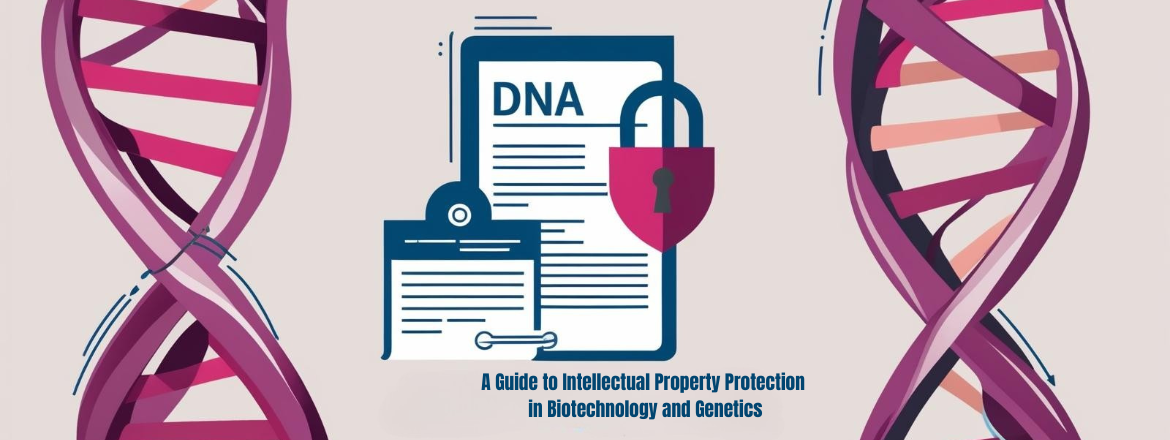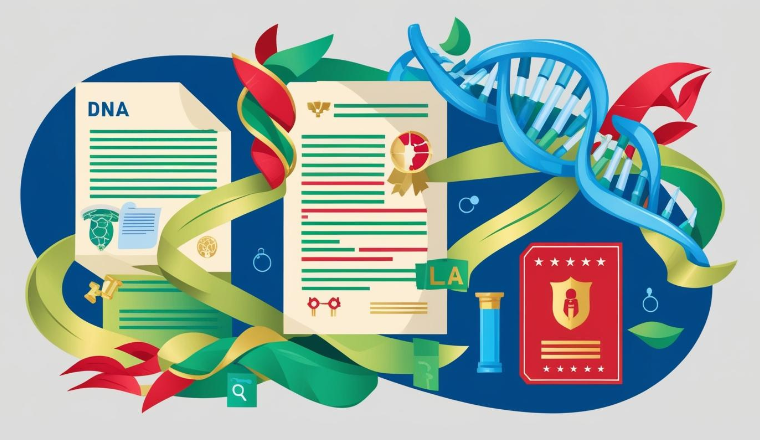A Guide to Intellectual Property Protection in Biotechnology and Genetics

Table of Contents
Biotechnology and genetics require huge investments for research but the return on investment will be delayed. Intellectual Property (IP) can help the industry recover the funds spent on research and development (R&D) in the biotech and genetics industry.
Proper IP protection is essential for researchers in this field to come up with critical innovations that are useful for people’s health. Failing to protect IP in the biotechnology and genetics field will lead to competitors replicating innovations. It will be hard for you to stop such infringers if you fail to register your IP.
This article discusses the key tenets of IP in biotechnology and genetics such as identification of IP assets, various strategies and their pros and cons, and steps involved in your journey from conception to commercialization. We can provide you with some useful tips to save your innovations from infringement:
Understanding IP in Biotechnology and Genetics
IP can be termed the lifeblood of the biotech and genetic industry due to the humongous R&D investment involved. Various aspects of innovations in biotechnology and genetics can be safeguarded through Patents, Trade Secrets, Trademarks, Copyrights, and Regulatory Exclusivity.
Patents
Once a company acquires a patent, specifics of its technology enter the public domain. It inspires other companies to create their own unique innovations. Patent licenses play a key role in new research and inventions in biotechnology and genetics and hence contribute immensely to human health and well-being.
Trade Secrets
Confidential information can be protected through trade secrets. The information can be processes, formulas, patterns etc. Trade secrets can be recorded if it is,
- Kept secret
- Has commercial value as it is kept secret
- Those responsible for controlling the information have taken reasonable measures to keep it confidential.
Any information meeting these criteria can be protected as trade secrets in biotechnology and genetics. It can be manufacturing processes, research methods, and formulas.
While patent information enters the public domain, trade secrets remain confidential. If trade secrets are leaked into the public domain, you can file a lawsuit against the culprits. However, the damage can be undone as the secret is no longer a secret. Typically, the information can be leaked by employees, developers, suppliers, collaborators, or any interested parties. Companies can use disclosure agreements to stop the theft of trade secrets.
Trademarks
Trademarks protect brand names, logos, and slogans used to distinguish products in the marketplace. In biotechnology, trademarks are useful for protecting product and company names and are used to brand products like pharmaceuticals, genetically engineered crops, branding/marketing terms, research tools and names for products, equipment, services and more. They are often overlooked, despite having real value later on when marketing becomes essential.
Trademark protection can last indefinitely as long as the mark is renewed and continues to be used in commerce.
Copyrights
Although it may seem unlikely, copyrighted works and copyright law are significant considerations in biotechnology. DNA sequences, in particular, have sparked debates regarding their eligibility for copyright protection as works of authorship. Although, it appears that the Copyright Office does not agree that DNA sequences are copyrightable.
They also protect original works of authorship like software, databases, technical manuals, and scientific publications. While limited to the expression of ideas rather than the ideas themselves, copyrights can still be useful in the biotech industry to protect materials such as educational content, digital media, bioinformatics software, genomic databases, and other informational tools.
Copyright protection lasts for the life of the author plus 70 years.
Regulatory Exclusivity
Regulatory exclusivity refers to a period of marketing exclusivity granted by regulatory agencies upon approval of a new drug, biologic, or medical device. In the US, the FDA may grant 3 to 7 years of exclusivity to prevent competitors from relying on the data in your application. The EU has similar provisions that grant 8 to 11 years of exclusivity. Regulatory exclusivity provides strong protection but only for a limited time.


Ethical Concerns and Challenges in Intellectual Property in Biotechnology and Genetics
The transformative power of biotechnology cannot be overlooked, especially in fields like medicine, agriculture, and other industries. However, the ethical challenges of IP in biotechnology and genetics are becoming more complex.
Biotech companies must strike a balance between promoting innovation and ensuring access to life-saving technologies. A balanced and morally responsible approach is the need of the hour. Some ethical challenges are listened to below:
Gene Patenting
Gene patenting is an exclusive right to a specific DNA Sequence granted by a government to an individual, organization or corporate entity. Holders of gene patenting rights can prevent others from looking at these genes. This exclusive right can hinder research and delay medical results.
Access to Genetic Information
Access to genetic information must be granted after considering concerns of equity and privacy. Issues of consent, data security, and discrimination must be addressed to guarantee fair access.
Infringement and counterfeiting
Ethical and legal challenges may arise when patented technologies are replicated without expressed consent.
Patenting Biotechnology and Genetic Inventions
Scope of Patentable Subject Matter
It is essential to learn what can be and what cannot be patented in the biotechnology industry. Patentable subject matter covers: Genetically engineered microorganisms transgenic animals, therapeutic proteins, diagnostics, research tools, and medical treatments.
Subject matter exclusions cover Laws of nature, natural phenomena, and abstract ideas.
A patent attorney or agent can help you determine the scope of patentable inventions in biotechnology and genetics.
Challenges in Patenting
The challenges of biotechnology patenting mainly arise from complex subject matter, ethical considerations, and rapidly evolving technologies.
The non-obviousness requirement is another hurdle with respect to genetic and biotech inventions due to the sector’s specialized nature.
Types of Patenting Options in Biotech and Genetics
Utility Patents: These types of patents safeguard the functional aspects of an invention for 20 years from the date of filing the patent application. Biotech inventions that come within the scope of a utility patent include gene sequences, diagnostics, therapeutics, and research tools.
Design Patents: It protects the ornamental design of a biotech invention for 15 years. You can protect the shape of a medical device or instrument with utility patents. The biggest benefit of utility patents is their lower inventiveness threshold.
Provisional Patents: These offer an affordable way to establish an early filing date while providing additional time for refining inventions before final patent submission.
Advantages and Disadvantages of IP in Biotechnology and Genetics
Advantages of IP in biotech: attracts investment, encourages innovation, facilitates technology transfer, and disclosure of information, and fosters healthy market competition.
Disadvantages of IP in biotech: limits access, inhibit research, innovation monopoly.
Parting Thoughts
Biotechnology and genetics companies have multiple options to protect their IP assets. Each IP right offers a different scope of protection, which requires careful analysis and strategy. An appropriate IP strategy must be based on the business plan, the type of asset that requires protection, and the validity of protection. An experienced IP company can provide you with the best IP strategy to protect your inventions, trade secrets, works of original authorship or branding elements.
Abounaja Intellectual Property is a well-known IP firm specializing in handling and safeguarding intellectual property rights in all fields including biotechnology and genetics. We have a highly experienced team that can assist you in protecting your valuable intellectual assets. Send us an email at [email protected] for a complimentary consultation.






